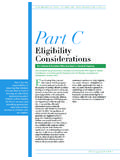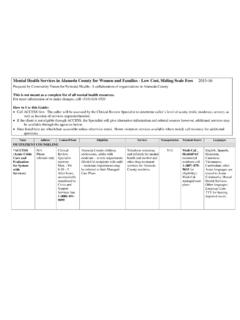Transcription of IMH & IDEA Part C Paper Page 1 July 2005
1 Infant mental health Approaches and IDEA part C. Position Paper Background Infant mental health approaches are receiving increasing attention by a variety of service systems. Research in the fields of infant development, early brain development and attachment theory, as well as evidence of the effectiveness of relationship-based approaches, account for at least some of this increased attention (Heffron, 2000). The IDEA Infant Toddler Coordinators'. Association (ITCA) believes that infant mental health approaches should be effectively integrated into the provision of all early intervention services as defined by Individuals with Disabilities Education Act (IDEA), part C.
2 The ITCA recognizes that a child's parents and other family members are usually the primary individuals supporting and nurturing the child's growth, development and learning (ITCA, April, 2000). Infant mental health approaches always support the child within the context of his/her relationship with parents and other primary caregivers. For all children, but perhaps even more so for young children with disabilities, interactions with caregivers shape a child's ability to learn, give and accept love, feel confident and secure, and demonstrate empathy and curiosity all abilities that are central to success in school (Oser &. Cohen, 2003; Lerner & Ciervo, 2004).
3 The importance of nurturing and supportive primary care giving relationships is also highlighted in From Neurons to Neighborhoods: Parents and other regular caregivers in children's lives are active ingredients of environmental influence during the early childhood period. Children grow and thrive in the context of close and dependable relationships that provide love and nurturance, security, responsive interaction, and encouragement for exploration. Without at least one such relationship, development is disrupted and the consequences can be severe and long lasting. If provided or restored, however, a sensitive caregiving relationship can foster remarkable recovery.
4 (National Research Council and Institute of Medicine (2000), p. 7.). Therefore, if early intervention is to promote positive developmental outcomes for infants and toddlers in IDEA part C, it must support the primary care giving relationship. The IDEA part C. early intervention system can play an important role in highlighting to families, service providers, and policymakers, the importance of social and emotional development and the overall mental health of young children and families, and the need for capacity-building in this arena. Purpose The purpose of this position Paper is to define and support the appropriate application of infant mental health approaches through early intervention supports and services under IDEA part C, IMH & IDEA part C Paper Page 1 july 2005 .
5 With families of infants and toddlers who have or who are at-risk for developmental delays and disabilities. The integration of these approaches into early intervention will help teams support parents in providing consistent, sensitive, and responsive parenting in order to promote their children's development. Recent public policy changes, including the reauthorization of IDEA (2004) and changes to the Child Abuse Prevention and Treatment Act (CAPTA, 2002), now require the referral of children birth to three when there is substantiated abuse or neglect or illegal substance use. While not changing IDEA part C eligibility, these changes recognize the role that early intervention can play in promoting the healthy development of young children who may be affected by adverse factors in the family environment, including abuse and neglect, homelessness and substance use.
6 Enhanced infant mental health approaches, as well as effective interagency collaborations across state systems will be needed to help promote the social and emotional development of these and other eligible children. In addition to promoting healthy social and emotional development, many children served through part C are at higher risk for behavioral problems and mental health disorders (including, traumatic stress disorders, regulatory or adjustment disorders, disorders of mood, relationship disorder etc.). It is therefore essential that IDEA part C promotes relationship-based approaches within early intervention practice, as well as work across service systems to promote a full continuum of infant/early childhood mental health services are available to meet the needs of families.
7 Definitions Infant mental health has been well defined by internationally recognized professional organizations. ZERO TO THREE defines infant mental health as, .. the developing capacity of the child from birth to age 3 to: experience, regulate, and express emotions; form close and secure interpersonal relationships; and explore the environment and learn -- all in the context of family, community, and cultural expectations for young children. Infant mental health is synonymous with healthy social and emotional development.. The World Association of Infant mental health describes infant mental health as, a field dedicated to understanding and treating children 0-3 years of age within the context of family, caregiving and community relationships.
8 Infant mental health is a term that is used both to describe the state of social and emotional well being in young children, and to describe a field of practice and research. In both uses of the term, the child is considered within the context of the relationship with his/her primary caregivers. The National Scientific Council on the Developing Child recognizes that young children experience their world as an environment of relationships, and these relationships affect virtually all aspects of their development intellectual, social, emotional, physical, behavioral, and moral . Infants rely on their parents and other primary caregivers to help them regulate and, over time, learn culturally acceptable ways to respond to and express emotions.
9 Infant development begins and continues within the context of an emotional relationship. We cannot understand and support the social and emotional development of infants and toddlers without also understanding and supporting their relationships with parents and other primary caregivers. IMH & IDEA part C Paper Page 2 july 2005 . Infant mental health encompasses a continuum of approaches in working with young children and their families that include: the promotion of healthy social and emotional development; the preventive-intervention of mental health difficulties; and the treatment of mental health conditions among very young children in the context of their families.
10 The following pyramid illustrates that promoting healthy social and emotional development should be done with all children and forms the base of this pyramid; that preventive-intervention occurs with those young children with or at-risk for social / emotional delays; and treatment for those few young children at the top of pyramid, whose needs can be addressed by mental health providers who can work with the child and family. Treat- ment Preventive- Intervention Promotion Infant mental health and IDEA, part C. IDEA part C promotes the development of infants and toddlers with or at risk for developmental delays or disabilities, and enhances the capacity of families to support their child's development.











